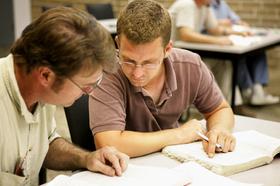- Blinn College exists for the primary purpose of serving educational needs of the people in its service area. Blinn College seeks to provide educational experiences and opportunities that will assist the student in developing intellectual curiosity, and social responsibility and skills and knowledge in support of a productive life. Underlying these basic goals is a strong commitment to instructional excellence through philosophical and financial support. The institution will be alert to the changing educational requirements of the region and endeavor to meet those needs.
School Highlights
Blinn College serves 18,220 students (48% of students are full-time).
The college's student:teacher ratio of 18:1 is higher than the state community college average of 17:1.
Minority enrollment is 36% of the student body (majority Hispanic), which is less than the state average of 71%.
Quick Stats (2024)
- Enrollment: 18,220 students
- In-state tuition: $3,264
- Out-state tuition: $5,064
- Student:teacher ratio: 18:1
- Minority enrollment: 36%
- Source: Integrated Postsecondary Education Data System (IPEDS)
Top Rankings
Blinn College ranks among the top 20% of public schools in Texas for:
Category
Attribute
Community Size
Student Earnings
School Overview
The teacher population of 995 teachers has stayed relatively flat over five years.
Blinn College
(TX) Community College Avg.
Carnegie Classification
Associates Colleges
Associates Colleges
Institution Level
At least 2 but less than 4 years
At least 2 but less than 4 years
Institution Control
Public
Public
Total Faculty
995 staff
262 staff

Student Body
The student population of Blinn College has declined by 9% over five years.
The student:teacher ratio of 18:1 has decreased from 20:1 over five years.
The Blinn College diversity score of 0.54 is less than the state average of 0.69. The school's diversity has declined by 9% over five years.
Total Enrollment
18,220 students
4,669 students

Student : Teacher Ratio
18:1
17:1

# Full-Time Students
8,733 students
1,310 students

# Part-Time Students
9,487 students
3,359 students



# Enrollment Undergraduate
151 students
344 students
# Full-Time Undergraduate Students
8,733 students
1,289 students

# Full-Time Graduate Students
n/a
16 students
# Part-Time Undergraduate Students
9,487 students
3,151 students
# Part-Time Graduate Students
n/a
50 students
Total Dormitory Capacity
1,489 students
252 students

% Asian
2%
5%

% Hispanic
21%
46%

% Black
7%
12%

% White
64%
29%

% Two or more races
3%
2%

% Non Resident races
1%
2%

% Unknown races
1%
4%


Diversity Score
0.54
0.69

College Completion Rate (Students who graduate in less than 4 years)
9%
26%

College Completion Rate (Students who graduate in 4 years or more than 4 years)
n/a
2.44%
Average Graduate Earnings (10 Years)
$42,600
$34,600

Tuition and Acceptance Rate
The public in-state tuition of $3,264 is less than the state average of $4,390. The in-state tuition has declined by 19% over four years.
The public out-state tuition of $5,064 is less than the state average of $6,601. The out-state tuition has declined by 35% over four years.
In-State Tuition Fees
$3,264
$4,390

Out-State Tuition Fees
$5,064
$6,601

% Students Receiving Some Financial Aid
66%
83%

Median Debt for Graduates
$11,500
$10,765

Median Debt for Dropouts
$5,500
$5,500

Acceptance Rate
n/a
78%
Source: 2021 (or latest year available) Integrated Postsecondary Education Data System (IPEDS)
School Notes
- Blinn College, the Junior College District of Washington County, is located in Brenham, Texas, and serves a 13 county service area with campuses in Bryan and Schulenburg. The school was founded in 1883 by the Southern German Conference of the Methodist denomination under the name of Mission Institution. In 1889 the name was changed to Blinn Memorial College in honor of the Reverend Christian Blinn of New York who had donated a considerable sum of money to make the school possible. The institution was originally founded for the purpose of training young men for the ministry, but in the course of time, to meet the demands of the public, academic courses were added. After operating for five years as an institution for men only, Blinn College was made coeducational in 1888. Until 1927 the school was of academy rank. In 1927 the Board of Trustees, under leadership of President Philip Deschner, organized a junior college. In 1930 the school was merged with Southwestern University (Georgetown, Texas). In 1934, a new charter was procured by the citizens of Brenham, and a private nonsectarian junior college, under the name of Blinn College, was organized with nine regents as the board of control. In February, 1937, all connection with Southwestern University and the Methodist denominations were severed. An election held in Washington County on June 8, 1937, for the purposes of creating a public junior college district and for levying a small tax, was successful. Blinn thus became the first county-owned junior college district in Texas. The college continues to operate as one of the largest of the state's 50 public junior/community college districts. For both the Associate in Arts Degree (AA) and the Associate in Science Degree (AS), any area of concentration offered at Blinn may be selected. However, traditional areas of concentration for the AA degree are: Communications, Criminal Justice, English, Foreign Languages and Speech/Theater Arts. Traditional areas of concentration for AS degrees are: Agriculture, Biology, Business/Accounting, Chemistry, Computer Science, Health/Kinesiology and Mathematics. Blinn College is accredited by the Commission on Colleges of the Southern Association of Colleges and Schools to award the associate degree. The Texas Higher Education Coordinating Board approves the courses and programs offered by Blinn College.
Frequently Asked Questions
How much does Blinn College cost?
Blinn College's tuition is approximately $3,264 for In-State students and $5,064 for Out-State students.
What is Blinn College's ranking?
Blinn College ranks among the top 20% of community college in Texas for: Largest student body and Highest graduate earnings (10 years post graduation).
School Calendar
View the Blinn College yearly calendar below. Note key dates such as:
Event
Date
Summer I 2024 10wk - Last Day to Drop/Withdraw
July 26, 2024 (Friday)
Summer II 2024 5wk - Last Day to Drop/Withdraw
July 26, 2024 (Friday)
Fall 2024 - First Day Bookstore Vouchers Available
July 29, 2024 (Monday)
Fall 2024 16wk, 1st 8wk & 1st 4wk - Last Day to Receive 100% Refund
August 20, 2024 (Tuesday)
Fall 2024 1st 4wk - Last Day to Receive 70% Refund
August 26, 2024 (Monday)
Recent Articles

Retaining Students through Innovation
Community colleges are heeding President Obama's call for student retention. Learn about the innovative programs some community campuses are creating that keep students in their classroom seats.

Community Colleges Fight Back Against For-Profit Attacks: The Rebuttal
After being attacked by private colleges, community colleges are mounting a defense and publishing studies that clearly outline the differences between the public and private institutions.

June 17, 2024
A to Z of Community College Certificates and CoursesFrom business and healthcare to technology and skilled trades, the article showcases the breadth of options available to students seeking to enhance their knowledge, develop new skills, or pursue career advancement.









